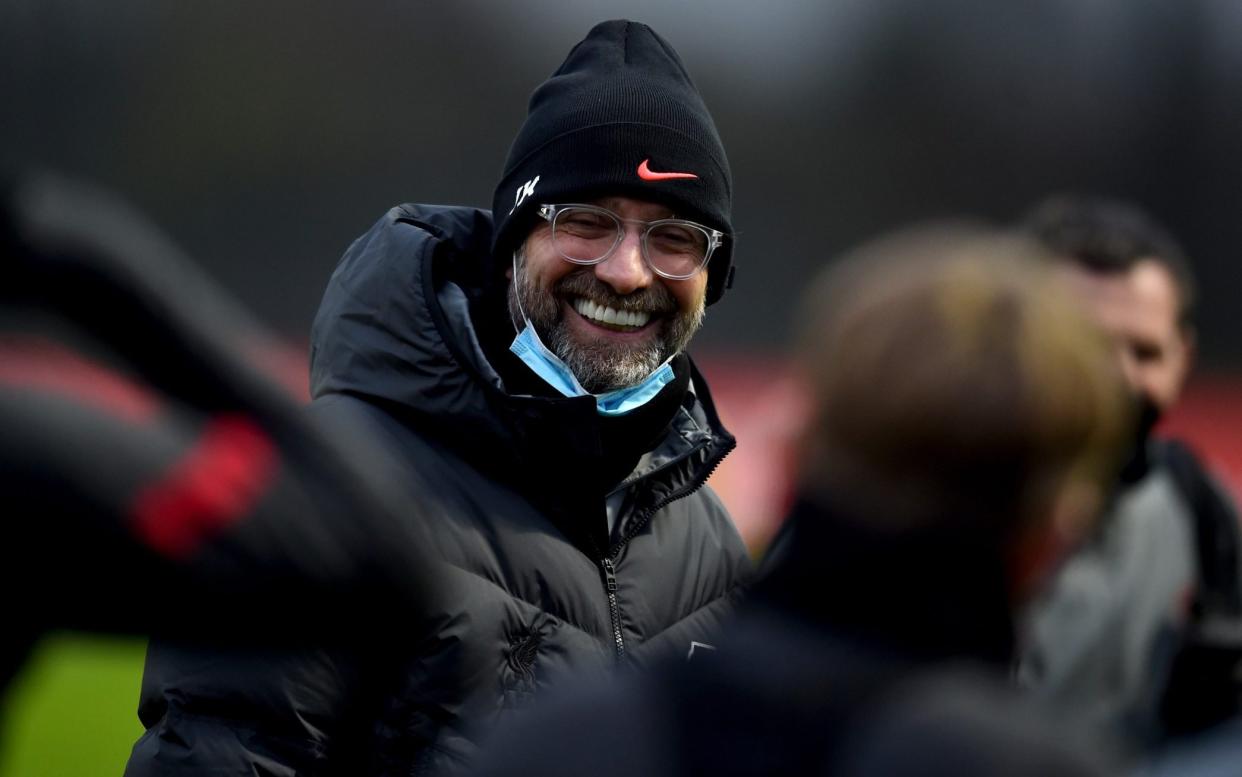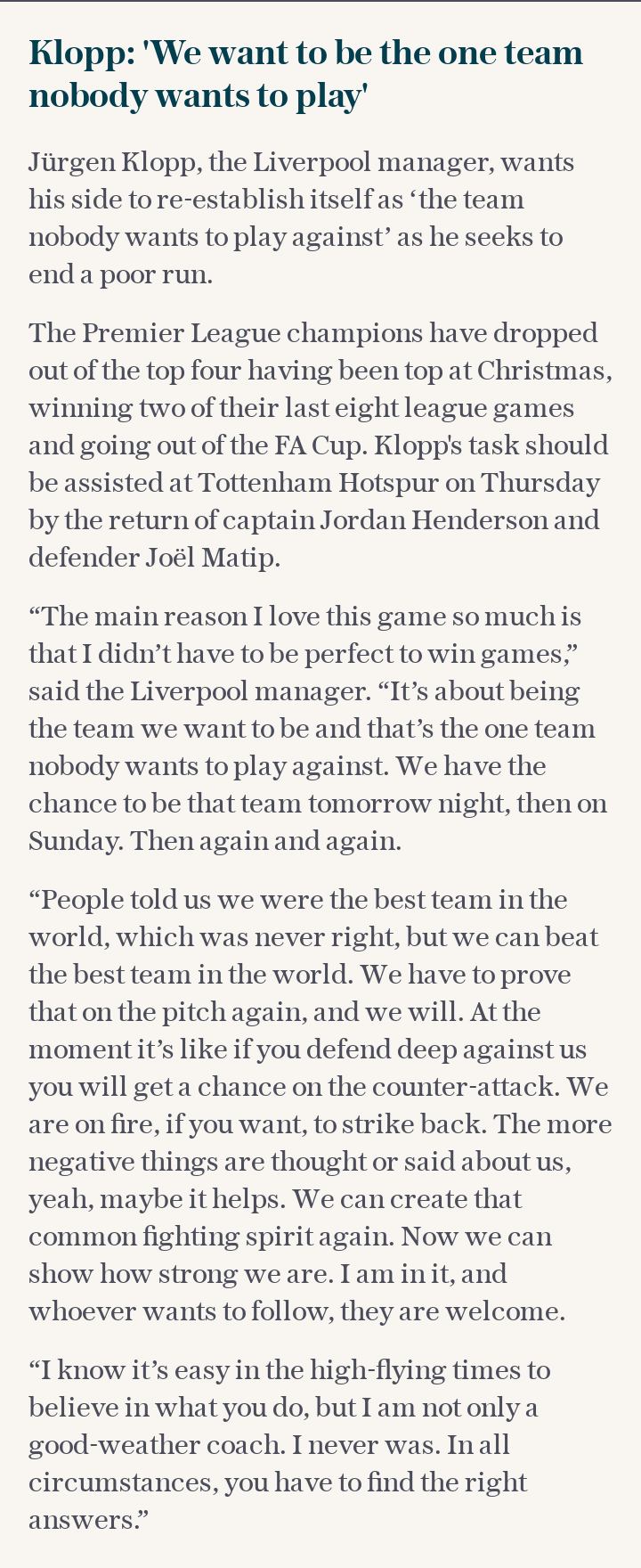Jurgen Klopp and Liverpool owners in no rush to dismantle what they have built

A couple of years into Jürgen Klopp’s Liverpool tenure he was given a choice.
Owners Fenway Sports Group told the manager there was £50 million available if he wanted to relocate from Melwood to a new training ground.
Klopp, who was still trying to lead the club back into the Champions League, had suggested merging the club's first team and academy. So determined were FSG to continue to reconstruct the club to satisfy their new coach, his advice was taken and plans formulated.
Klopp knew the cost but enthusiastically agreed, even though it meant sacrificing funds which he could have ploughed into his squad.
Few managers at elite Premier League clubs would have embraced a capital project over squad strengthening. More pertinently, few boardrooms would have considered the views of the coach such a deal-breaker given — on average — most Premier League coaches only stay in the job for 789 days.
If £50 million in loose change is available, most coaches request players. Many are too insecure to see the bigger picture. Klopp was already empowered to think and act differently to his Premier League peers, but it was not as straightforward a decision as it now looks. On the day Liverpool confirmed the training ground scheme on February 21, 2017, they were not even playing in European competition. To the outside world — especially impatient supporters — they had other pressing priorities like a new centre-back and goalkeeper.
What the process underlined early in Klopp’s tenure was mutual trust between the manager and his board.
Despite a more troubling period of two wins in eight Premier League games, there is no sign or likelihood of that dissipating. That’s part of the reason why Klopp chose Liverpool.
“I was lucky with the clubs I had,” he reiterated on Wednesday. “The owners and presidents and sporting directors knew it takes time.”
He has also earned more power than he could have imagined, granted due deference on decisions ranging from construction of the training HQ to who is responsible for the contents of the canteen’s salad bar.
For over five years, FSG have openly given the impression they are in awe of Klopp. If he called principal owner John W. Henry and requested another four-year deal, he would be asked, 'are you sure you do not want to make it five?'. Add to that delivery of the Champions League and Premier League, and it is hard to conceive a situation in which Klopp’s position will ever be questioned within the club. That’s before we take into consideration the strength of his relationship with Liverpool supporters which is now at a level comparable to Bill Shankly.
That is why even if Liverpool’s difficult season deteriorates before it improves — and there is every chance given the demanding run of games starting at Tottenham Hotspur on Thursday night — there is no credible comparison between the Premier League champions and those who suffered relationship breakdowns between coach and boardroom shortly after title wins.
There is zero prospect of Fenway Sports Group echoing Chelsea when they tired of Antonio Conte or Jose Mourinho’s blame games after poor title defences, or Leicester City when they told Claudio Ranieri, ‘thanks very much, but it’s time for a new direction’ when relegation was feared within a year of his Premier League win. Manchester City were willing to offload Roberto Mancini and Manuel Pellegrini when they could not build on title successes because the club craved the long-term stability they now have under Pep Guardiola.
Liverpool, despite the current mutterings about the failure to sign a centre-back, have sought to be the antithesis of the dysfunction they see in others, even those who enjoyed extraordinary success.
Klopp and FSG president Michael Gordon will talk daily about how to find solutions, not plot means by which to deflect problems onto someone else within the organisation.
When Klopp’s more recent overview of a troubling period stated it would be preferable if the club could find a centre-back but ‘it is not his decision’, it was not some kind of Machiavellian political manoeuvre of which Thursday’s opponent Mourinho would be proud.
It was an extension of a message Klopp has delivered often, not just this season but throughout his reign. Liverpool will stick steadfastly to their self-sustaining model. Klopp has always bought into and accepted that, while still having the final decisions on who to sign.
“If I don’t want a player to come to the club he will not come. It’s normal,” Klopp has often said.
Klopp was the chief architect of the ‘Virgil van Dijk or no-one’ policy in 2017, eventually signing the centre-back six months after the tapping up controversy. Other managers would have spent the summer complaining about the lack of alternatives.
He did the same when ignoring calls to replace Simon Mignolet and Loris Karius in January 2018 because a world-class goalkeeper was not for sale midway through a season. Did that decision ultimately cost Liverpool the Champions League a year before they won it? Perhaps, but Alisson Becker’s subsequent arrival was worth the wait, despite the pain endured against Real Madrid in Kiev.
Klopp also resisted the calls to sign a like-for-like replacement for Philippe Coutinho. He probably would have had there been any money left over following the Van Dijk and Alisson deals, but adjusted accordingly.
There are similarities in January 2021 because Liverpool have found that the centre-halves they consider good enough are unavailable, or beyond a reasonable or affordable price range. Clubs do not want to sell quality players in January. It is a valid question as to whether Liverpool should be looking for players who are good enough to stay in the side once Van Dijk and Joe Gomez are fit, or simply need a more experienced, short-term alternative to teenager Rhys Williams, Nat Phillips and Jordan Henderson. It would still be naive to believe Klopp has not been central to those discussions rather than some by-stander waiting for a phone call.
In what amounted to a defence of his owners, Klopp said as much earlier this month. "In good times everybody thinks our owners are really generous and in bad times everyone thinks they are really tight,” he said.
"They see exactly the same things I see about the necessity [to bring in] players and it is not that I say 'by the way, a centre-half would be really nice' and they say 'wow, a centre half, really, why?'
Hence, Klopp’s frustration with Liverpool’s current predicament does not manifest itself with digs at his owners. Their management philosophy is part of the package which means while he has been secure from day one, he had no cause to envy Frank Lampard's spending last summer, and might look with incredulity at Thomas Tuchel getting only an 18 month deal for a Chelsea 'project'.
“Mr Abramovich gives you some chances with money for players, but is not the most patient person in the world,” Klopp said of Lampard’s sacking. The contrast with FSG could not be starker.
Klopp's recent remarks are a reflection of the broader situation and a multitude of reasons behind the form dip — the most critical of which are external such as the pandemic, lack of supporters and knock-on effect of the injury to a world-class defender.
Liverpool’s players finally moved into their new accommodation — now branded the AXA Training Centre — in November.
As much as he would like to give a guided tour to a new centre-back, there will not be a moment during which Klopp walks around the site and considers the £50 million should have been invested in his team.


 Yahoo News
Yahoo News 
